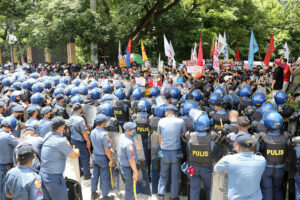
GSP+ extended amid dire rights situation — activist groups
By Kyle Aristophere T. Atienza, Reporter
PHILIPPINE CIVIL society has voiced concern about the expected extension of Philippine privileges under the European Generalized Scheme of Preferences Plus (GSP+), saying the government of President Ferdinand R. Marcos, Jr. has not addressed human rights issues.
In Defense for Human Rights and Dignity Movement and Trade Justice Pilipinas cited President Marcos’ failure to address attacks on critics and activists. Philippine laws still are being weaponized to stifle dissent, it added.
“The Philippine government seems to be advancing the narrative that the proposed extension of GSP+ privileges of the Philippines reflects somehow a vindication against these criticisms and that the program can proceed as before,” Joseph Purugganan, co-coordinator at iDefend and coordinator at Trade Justice Pilipinas, said in a Facebook Messenger chat.
He added that European policymakers supported the European Commission’s proposal to extend the privileges enjoyed by the Philippines and other developing countries under the trade scheme “not because of a more favorable assessment of the human rights situation but simply because the EU ran out of time to pass new GSP+ regulations.”
The European Parliament and European Council supported a European Commission proposal for a “rollover of the existing GSP+ for another four years,” Philippine Trade Secretary Alfredo E. Pascual said last week.
The deal, which gives the country zero duty on 6,274 locally made products, is set to expire by yearend.
In exchange, the Philippines must uphold commitments to 27 international conventions on human rights, labor, good governance and climate action.
As of June 30, a year into Mr. Marcos’s term, 342 people have been killed by state actors in connection with illegal drugs, according to a report from the Dahas Project from the University of the Philippines Third World Studies Center. “This is higher than the 302 reported in the last year of the Duterte administration,” it said.
Human Rights Watch said the European Union (EU) has tolerated human rights violations in the country by allowing it to continue enjoying the trade perks even at the peak of the bloody war on drugs of ex-President Rodrigo R. Duterte.
The report “shows that the bloc has tolerated too many serious human rights abuses under Duterte, sending a message of impunity that now risks echoing through the Marcos administration,” Claudio Francavilla, the group’s Senior EU Advocate, said in a statement.
The government estimates that at least 6,117 people were killed in Mr. Duterte’s drug war between July 1, 2016 and May 31, 2022, but human rights groups say the death toll could be as high as 30,000.
On Friday, Mr. Marcos said the government is considering rejoining the ICC, which is investigating the state’s anti-illegal drug campaign, months after saying the Philippines would disengage from the tribunal.
The ICC investigation covers crimes committed in Davao City from November 2011 to June 2016 when Mr. Duterte was still its mayor, as well as cases during his presidency up until March 16, 2019, the day before the Philippines officially withdrew from the court’s Rome Statute.
“The EU should learn and apply the lessons of the last six years to ensure that the continued implementation of the program will not be ‘business as usual,’” Mr. Purugganan said. “It has the power and the responsibility to continue to use this program to compel the Marcos administration to address the continuing human rights concerns.”
While human rights violations in the Philippines have eased, the EU should not overlook human rights issues to sustain and strengthen economic relations, the Philippine Alliance of Human Rights Advocates (PAHRA) said via Messenger chat.
The EU should adopt a more stringent approach to address any possible lapses by the Marcos government in democratic norms and human rights, it added.
The EU and Philippine government should “engage civil society and other development partners in the process of reforming the GSP+, said Sandino Soliman, executive director of the Caucus of Development NGO Networks.
“This is a crucial opportunity to institutionalize the role of civil society in monitoring not only the terms of the EU-GSP+ but also the international commitments covered by the scheme,” he added.



